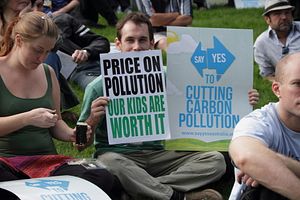One of Tony Abbott’s close advisers has suggested climate change is a UN-led conspiracy to institute world government. Climate change has turned into an example of identity politics in Australia.
“This is not about facts or logic. It’s about a new world order under the control of the UN.” Though the man he advises may make a few public missteps, the prime minister’s business adviser Maurice Newman was not speaking off the cuff and accidentally confusing a questioning of some aspects of climate study with morbid paranoia. He was writing in The Australian, a nationally distributed broadsheet owned by News Corp. His freedom to say he believes the lugubrious international organization wishes to overthrow democracy has been defended, though the environment minister has made it clear that he does not hold those views. “It is not a view I have or would express,” said Greg Hunt.
This is not new ground for Newman. He has been saying the same thing for a while, although the new world order (usually capitalized by the conspiracy theorists who favour the concept) suggestion is new. More typically Mr Newman has used climate change as a shorthand for identity politics. “Elites” see it as a “new Marxism” and use totalitarian methods to shut down those who disagree. Meanwhile, in the midst of all the pretend global warming the poor are dying from cold, he has said. The most recent and comprehensive report about climate change in Australia has suggested there will be more extreme temperatures in both directions, though in general there will be fewer cold days and more hot.
Climate change has been a charged issue in Australia. Most recently the Abbott government gave Dane Bjorn Lomborg a A$4 million grant to set up the Australian Consensus Centre; his Copenhagen Consensus Centre was to partner with the University of Western Australia, though the institution has latterly backed out. The government abolished the Climate Commission in 2013 as its A$1.5 million costs were too high. Lomborg does not apparently totally disbelieve climate change, but does say the threats are overstated.
“We are having discussions internally about the best way to deliver the Australian Consensus Centre. You can be certain it will happen. Freedom of speech demands that it does,” Education Minister Christopher Pyne said Monday. Freedom of speech has been an important and central concept in Australian debate over climate change; those who disagree with those who disagree with the broader scientific consensus regarding climate change are totalitarian. “Make no mistake, climate change is a must-win battlefield for authoritarians and fellow travellers,” wrote Newman Friday.
Often varied sectors of the commentariat, on both sides of the political spectrum, complain that Australia is becoming more like the United States. It’s not an entirely new criticism and it’s popped up throughout the postwar period. Often it refers to little more than changing consumer habits or entertainment preferences. But the growth of identity politics and partisanship is seen as another example. What the scientific community once innocently saw as a scientific issue, not a morally charged political one, has turned into a focal point for political alignment. To believe in the possibly bad effects of climate change and wish to mitigate these is to risk being an “elite,” an effete lefty deeply, and loudly, invested only in one’s own moral goodness. On the other side, questioning climate change is considered “backward.” Climate conflict is often reported on ‘tribal’ lines, as the Australian Broadcasting Corporation noted at the end of April with a Media Watch piece on Lomborg, covering the furore over his posting.
This is not unique to Australia, or the United States, but recent years have seen particular vitriol on both sides especially regarding things such as the emissions trading scheme (now defunct). Newman’s comments may be business as usual, when it comes to Australian climate debate, though by suggesting the UN is doing reasonably well in its efforts to institute world government he is crediting the body with far greater effectiveness and organizational powers than many of his colleagues would countenance.
Helen Clark was based in Hanoi for six years as a reporter and magazine editor. She has written for two dozen publications including The Diplomat (as Bridget O’Flaherty), Time, The Economist, the Asia Times Online and the Australian Associated Press.

































